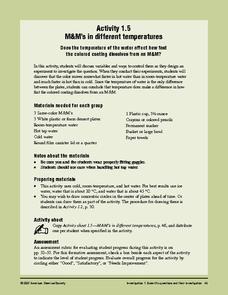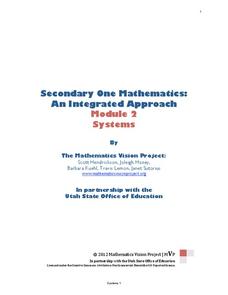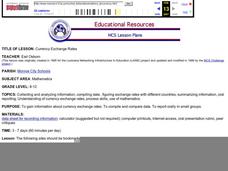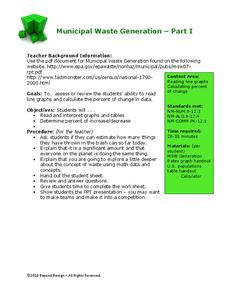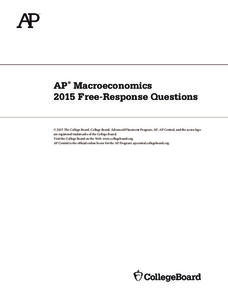EngageNY
Why Do Banks Pay YOU to Provide Their Services?
How does a bank make money? That is the question at the based of a lesson that explores the methods banks use to calculate interest. Groups compare the linear simple interest pattern with the exponential compound interest pattern.
Noyce Foundation
Sewing
Sew up your unit on operations with decimals using this assessment task. Young mathematicians use given rules to determine the amount of fabric they need to sew a pair of pants. They must also fill in a partially complete bill for...
American Chemical Society
M&M's in Different Temperatures
Help your class come up with a procedure for comparing the dissolving rates of colored candy coating in different temperatures of water. If you are placing importance on controlled variables with your class, make sure that they use equal...
Mathematics Vision Project
Quadratic Functions
Inquiry-based learning and investigations form the basis of a deep understanding of quadratic functions in a very thorough unit plan. Learners develop recursive and closed methods for representing real-life situations,...
Population Connection
Where Do We Grow from Here?
Did you know that the population is expected to grow to 11 billion by 2100? The resource serves final installment in a six-part series on the global population and its effects. Scholars interpret data from the United Nations about the...
101 Questions
Finals Week
What energy drinks have the highest concentration of caffeine? Pupils compare five energy drinks with different amounts of caffeine and different volumes. They must solve the ratios to understand the differences. An extension compares...
Mathematics Vision Project
Module 2: Systems of Equations and Inequalities
The brother-sister pair Carlos and Clarita need your class's help in developing their new pet sitting business. Through a variety of scenarios and concerns presented to the siblings, the learners thoroughly explore systems of equations...
Curated OER
Math: Currency Exchange Rates
Sixth graders apply the division and multiplication of decimals to convert dollars to various international currencies. In a travel simulation activity, they convert money, distance, and temperatures. During their "trip," students...
Curated OER
Comparative Geography I
Students use population density and other statistics to compare countries. They find the population density for the countries listed in the table. Students compare findings with a partner, and then share with the class.
Curated OER
Economic Recovery? a Comparison of Indicators for Utah And the United States Since March 2001
Students discuss key business and consumer indicators that are used to measure the health of the economy. They compare the economic recovery (from the 2001 recession) of Utah and the United States. They discuss the benefits and...
Curated OER
Building Sets of 13 and 14
Compose and decompose sets of 13 and 14 and compare sets of each with your little learners. They use objects to construct sets of 13 and 14, record their answers, and compare sets in several different ways.
Curated OER
Currency Exchange Rates
Students, in groups, choose three countries from which to investigate exchange rates versus the US dollar. Using Internet research they follow daily exchange rates and compute the percentage change. They compile data and prepare and...
Curated OER
Comparing and Ordering Numbers
Students compare, order, and measure objects. In this measurement lesson, students are assessed on their ability to order, compare, and measure objects. This is an assessment only lesson and does not include instruction.
Curriculum Corner
8th Grade Math "I Can" Statement Posters
Clarify the Common Core standards for your eighth grade mathematicians with this series of classroom displays. By rewriting each standard as an achievable "I can" statement, these posters give students clear goals to work toward...
Curriculum Corner
Guest Teacher Plans: Grade 6
Taking a day off of school can feel like a lot more work than going because of the time and effort that goes into making sub plans. Make your life easier with a daily plan for a guest teacher designed to meet the needs of sixth...
Beyond Benign
Municipal Waste Generation
Statistically, waste may become a problem in the future if people do not take action. Using their knowledge of statistics and data representation, pupils take a look at the idea of waste generation. The four-part unit has class members...
Curated OER
Describing Data
Your learners will practice many ways of describing data using coordinate algebra in this unit written to address many Common Core State Standards. Simple examples of different ways to organize data are shared and then practice problems...
College Board
2015 AP® Macroeconomics Free-Response Questions
Currency exchange is a big factor in governments making economic decisions. Scholars consider various scenarios to evaluate how factors such as interest rates and private investments would affect a nation's economy using a practice test...
Chicago Botanic Garden
Historical Climate Cycles
Scientists use ice core samples to obtain temperatures of the earth from 400,000 years ago! The third of five lessons instructs pupils to interpret historical climate data to see changes over time. In part I, participants interpret...
Curated OER
Comparing Ratios
In this comparing ratios worksheet, students solve and complete 3 different problems using the screens shown. First, they write a ratio that compares the shaded part to unshaded part illustrated. Then, students use the same grid to...
Curated OER
Character Education: Honesty
Middle schoolers define what honesty means. They will discuss omission as a form of telling lies. Furthermore, they will compare and contrast to other forms of lying. In the end, they give examples of different types of lies and evaluate...
Curated OER
Comparing Candy Bars
Eighth graders identify that a ratio is a comparison of two numbers and that a proportion is an equation that equates two ratios. They identify the extremes and means of proportions, as well as the product of the extremes equals the...
Curated OER
Circulatory and Respiratory Systems Unit - Biology Teaching Thesis
Students Explain how an increased level of activity translates to cells needing more oxygen and how the lungs supply this oxygen by entering the blood stream. They also can explain that the heart is responsible for moving both oxygenated...
EngageNY
Solving Problems in Two Ways—Rates and Algebra
Build confidence by using multiple approaches to problem solving! This resource uses a visual and algebraic approach to solving application problems. A discussion is included about efficient approaches to different problems.


